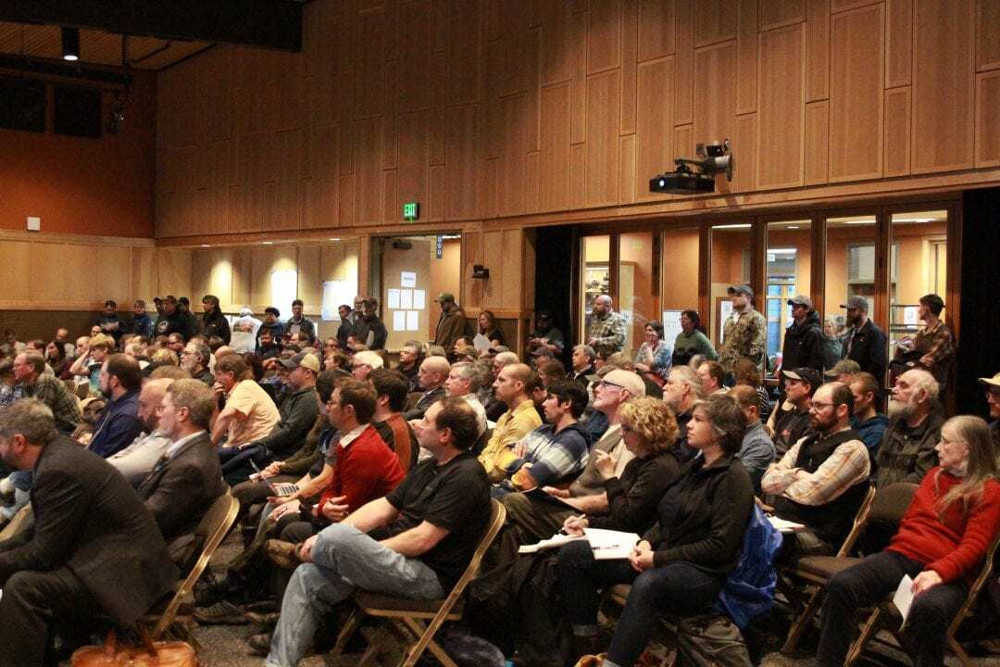
Alaska’s Board of Fisheries this week voted to delay the dates for meetings planned in Cordova and Ketchikan this winter because of the COVID-19 pandemic. Board members want to hold those meetings in-person and will consider springtime gatherings instead. Next month, they’ll hold an online meeting with more information about the schedule for the upcoming year and decisions the board has to tackle before the spring.
The board regulates commercial, sport and subsistence fisheries across Alaska. Its meetings focus on a different region every three years. They can attract hundreds of people–from the industry and the public –to testify on proposed changes to allocations and fishing rules before the board and dozens of agency staff.
The board’s executive director Glenn Haight outlined the cleaning, distancing and other precautions that would be required for holding in- person meetings, especially in winter, the middle of cold and flu season. Those include having redundant staff ready to fill in if a person is sent home sick.
“It’s inconceivable for those of us that have been to these meetings to think that we could get through a board meeting where no one gets sick, I mean not of COVID, but just of a common head cold,” Haight said. “And according to what we’ve said is our rules is if you’re sick you need to leave and go get tested.”
The board has a work session scheduled for October. After that the schedule had a week-long meeting to consider finfish and shellfish regulation changes for Prince William Sound. That was planned in mid-December in Cordova. The next Southeast Alaska finfish and shellfish meeting was planned for Ketchikan in early January. For that, the Alaska Department of Fish and Game, fishermen, advisory committees and tribes have submitted over 150 proposed changes to commercial, sport and subsistence fishing regulations. Support staff recommended holding the fall work session online, and pushing back the Prince William Sound and Southeast meetings to sometime in 2021.
Fish and Game put out a survey this summer on the meeting format and received 234 responses. They ranged from requests to delay meetings a year to skepticism that the pandemic is a real threat. Some staff and members of the public questioned whether the board process would work in an online format.
Fish and Game commissioner Doug Vincent-Lang said he did not see how the state could conduct in-person meetings in Cordova and Ketchikan as soon as this winter.
“Both Cordova and Ketchikan would love to host these board meetings because it brings economic benefit to those communities and it’s an opportunity for them to have a meeting in their community,” Vincent-Lang said. “But again when we’re talking about bringing in 50-60 people into a meeting, into a community as small as Cordova that is somewhat problematic in terms of how we deal with testing, how we deal with public health and a variety of other things.”
Officials and board members both highlighted the importance of in-person public participation and staff support while drafting new regulations.
Board member John Wood said he was not interested in holding meetings online.
“I’m hoping that we’re not going to put off life entirely waiting for a vaccine to be developed,” Wood said. “I can only point out the flu vaccines that are given on an annual basis and the rate of death is still pretty significant among that group and I don’t see that changing with COVID. I think COVID’s going to follow that same track. And it’s about time that we in the public at least start putting our lives back together and have some kind of normalcy.”
Board chair Märit Carlson-Van Dort also did not want online meetings with the exception of one next month.
“I think that there’s an incredible amount of important insight, information, discussion, compromise that wouldn’t be allowed to take place in that format,” Carlson-Van Dort said. “However, for the purpose of October, it is my opinion that I think we could probably sort our way through that in a virtual format given the restrictions in Anchorage and whatnot and just the uncertainty therein.”
Alaska’s largest city last month instituted a 30-person limit on indoor gatherings.
The board agreed that staff would come up with plans for holding the Cordova and Ketchikan meetings in-person. That could be in March, April or May of next year, depending on the status of the pandemic and health protocols. They also agreed to hold next month’s Anchorage work session online. That meeting will include whether or not to consider some proposals out of cycle. The board also hopes to identify pressing issues that need decisions before springtime meetings. In Southeast those may include the status of stocks of concern and king salmon management measures.
Also on the agenda for the October work session is the status of board nominees who have not been confirmed. Another topic will be conflicts of interest for board members and their participation in decisions that could benefit them.
(web only: six board members participated by teleconference with McKenzie Mitchell not taking part.)









